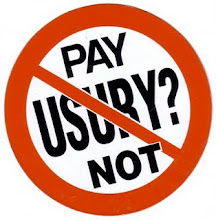excerpt from Wikipedia... just to share---points to ponder---especially on overreaching interest charged to a totally disabled veteran on child support arrearage for children now 30,27,26...
For example, Cato in his De Re Rustica said:
"And what do you think of usury?" — "What do you think of murder?"
But one must always consider that usury, in historical context, has always been inextricably linked to economic abuses, mostly of the masses and of the poor; but sometimes of the financier and royalty, as bankrupt royalty has led to many a demise, thus frowning upon lending at interest or for a euphemistic "just profit"[clarification needed]. The main moral argument is that usury creates excessive profit and gain without "labor" which is deemed "work" in the Biblical context. Profits from usury are argued not to arise from any substantial labor or work but from mere avarice, greed, trickery and manipulation. In addition, usury is said to create a divide between people due to obsession with monetary gain. Most importantly, usury is the derivation of profit from biological time, which is linked to life, considered sacred, God-given and divine, leading to excessive worrying about money instead of God, thus subjugating a God-given sanctity of life to man-made artificial notions of material wealth.
Interest of any kind is forbidden in Islam. As such, specialized codes of banking have developed to cater to investors wishing to obey Qur'anic law. (See Islamic banking)
As the Jews were ostracized from most professions by local rulers, the church and the guilds, they were pushed into marginal occupations considered socially inferior, such as tax and rent collecting and moneylending. Natural tensions between creditors and debtors were added to social, political, religious, and economic strains.
...financial oppression of Jews tended to occur in areas where they were most disliked, and if Jews reacted by concentrating on moneylending to non-Jews, the unpopularity — and so, of course, the pressure — would increase. Thus the Jews became an element in a vicious circle. The Christians, on the basis of the Biblical rulings, condemned interest-taking absolutely, and from 1179 those who practiced it were excommunicated. Catholic autocrats frequently imposed the harshest financial burdens on the Jews. The Jews reacted by engaging in the one business where Christian laws actually discriminated in their favor, and became identified with the hated trade of moneylending.
Peasants were forced to pay their taxes to Jews who were economically coerced into becoming the "front men" for the lords. The Jews would then be identified as the people taking their earnings. Meanwhile the peasants would remain loyal to the lords.
In England, the departing Crusaders were joined by crowds of debtors in the massacres of Jews at London and York in 1189–1190. In 1275, Edward I of England passed the Statute of Jewry which made usury illegal and linked it to blasphemy, in order to seize the assets of the violators. Scores of English Jews were arrested, 300 were hanged and their property went to the Crown. In 1290, all Jews were expelled from England, and allowed to take only what they could carry; the rest of their property became the Crown's. The usury was cited as the official reason for the Edict of Expulsion. However, not all Jews were expelled: it was easy to convert to Christianity and thereby avoid expulsion. Many other crowned heads of Europe expelled the Jews, although again conversion to Christianity meant that you were no longer considered a Jew (see the articles on marranos or crypto-Judaism).
The growth of the Lombard bankers and pawnbrokers, who moved from city to city along the pilgrim routes, was important for the development of trade and commerce. Die Wucherfrage is the title of a Lutheran Church - Missouri Synod work against usury from 1869. Usury is condemned in 19th century Missouri Synod doctrinal statements.
In the 16th century, short-term interest rates dropped dramatically (from around 20–30% p.a. to around 9–10% p.a.). This was caused by refined commercial techniques, increased capital availability, the Reformation, and other reasons. The lower rates weakened religious scruples about lending at interest, although the debate did not cease altogether.
The papal prohibition on usury meant that it was a sin to charge interest on a money loan. As set forth by Thomas Aquinas, the natural essence of money was as a measure of value or intermediary in exchange. The increase of money through usury violated this essence and according to the same Thomistic analysis, a just transaction was one characterized by an equality of exchange, one where each side received exactly his due. Interest on a loan, in excess of the principal, would violate the balance of an exchange between debtor and creditor and was therefore unjust.
Some have suggested that the development of double entry bookkeeping would provide a powerful argument in favor of the legitimacy and integrity of usury but this is an obvious non-sequitur. Business has always been accepted as a right and proper activity by all cultures, including those that reject usury.
=======================================================
Usury (in the original sense of any interest) was at times denounced by a number of religious leaders and philosophers in the ancient world, including Plato, Aristotle, Cato, Cicero, Seneca,[14] Aquinas,[15] Muhammad,[16] Moses,[citation needed] Philo[citation needed] and Gautama Buddha[citation needed].[17]
NOTE: This article is originally published at this website:
http://www.writersontheloose.com/writers/writer1323/index.cfm?story=54583



0 Comments:
Post a Comment
<< Home